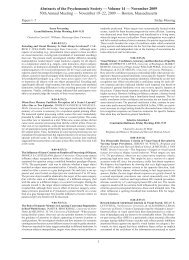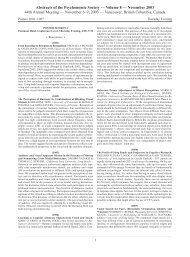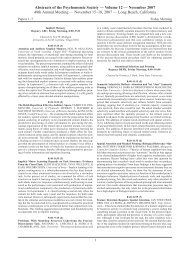Abstracts 2005 - The Psychonomic Society
Abstracts 2005 - The Psychonomic Society
Abstracts 2005 - The Psychonomic Society
You also want an ePaper? Increase the reach of your titles
YUMPU automatically turns print PDFs into web optimized ePapers that Google loves.
Friday Evening Posters 3105–3111<br />
(3105)<br />
Emotion, Experiential Congruity, and Content Type in Conditional<br />
Reasoning. SHARON LEE ARMSTRONG, La Salle University—<br />
Neutral content has been shown to produce superior validity judgments<br />
in conditional arguments over content that is incongruent with<br />
real-world experience. This study additionally examined the role of<br />
the emotional content of conclusions. Forms of arguments and types<br />
of congruity relationships were varied (e.g., psychological laws, social<br />
rules, moral principles). Arguments with conditional premises<br />
that were consistent with life experiences were easier to evaluate than<br />
arguments posed in neutral terms, and difficulty increased when the<br />
content was incongruent with experience. <strong>The</strong> nature of the incongruity<br />
mattered; subjects were especially helped or hurt (relative to<br />
congruity) by the moral rules. Although conclusion affect had no effect,<br />
this does not mean that there were no emotional responses that<br />
mediated performance. States of affairs that violate certain expectations<br />
may evoke an emotional response that is more intense than the<br />
response to states of affairs judged pleasant or unpleasant out of context.<br />
(3106)<br />
Conditional Reasoning, Conditional Probability, and the “Fast”<br />
System. JOHN BEST, Eastern Illinois University—Dual-process theories<br />
of reasoning suggest that conditional reasoning may be accomplished<br />
by two systems: (1) a fast, associative system that operates<br />
probabilistically and (2) a slower system that may be cognizant of<br />
principles of logical necessity. When applied to conditional reasoning<br />
(If P then Q), dual-process theorists have suggested that the fast system<br />
may perform a conditional probability computation, converting<br />
the statement above to a computation of the Prob (Q/P). However,<br />
when people were invited to use conditional reasoning to draw deductions<br />
from an array of information in which the conditional probability<br />
of certain conclusions had been varied, the findings showed<br />
that the variability with which people drew particular inferences was<br />
not accounted for by variations in the actual conditional probability<br />
of those inferences. Rather, people’s deductions were based on much<br />
cruder measures of frequency and covariation, and such deductions<br />
were as likely to be inaccurate as they were to be correct.<br />
(3107)<br />
Availability in Inductive Reasoning. PATRICK SHAFTO, Massachusetts<br />
Institute of Technology, & JOHN D. COLEY & DAVID BALDWIN,<br />
Northeastern University (sponsored by John D. Coley)—Previous research<br />
presents conflicting evidence about novices’ use of context to selectively<br />
guide induction. We propose that patterns of inference result<br />
from the relative availability of different kinds of knowledge. We present<br />
three experiments examining the use of taxonomic and ecological<br />
knowledge in folk biological induction. In Experiment 1, familiarity with<br />
taxonomic and ecological relations was not sufficient to induce selective<br />
inferences about novel properties, diseases, and toxins shared by taxonomically<br />
and ecologically related species; novice participants relied<br />
disproportionately on taxonomic knowledge. In Experiment 2, novices’<br />
judgments of similarity for ecologically, but not taxonomically, related<br />
species were sensitive to priming. In Experiment 3, time pressure disproportionately<br />
reduced novices’ ecological, but not taxonomic, inferences.<br />
Together, these studies show that mere possession of relevant<br />
knowledge is not sufficient for fostering context-sensitive inferences and<br />
that differences in the availability of taxonomic and ecological knowledge<br />
account for novices’ patterns of inference.<br />
• JUDGMENT AND DECISION MAKING •<br />
(3108)<br />
Intuitive Judgments of Semantic Coherence Under Different Response<br />
Deadlines. ANNETTE BOLTE, Technische Universität Braunschweig,<br />
& THOMAS GOSCHKE, Technische Universität Dresden—<br />
Intuition is the ability to judge stimulus properties on the basis of<br />
information that is activated in memory but not consciously retrieved.<br />
We investigated one central feature of intuitive judgments—namely,<br />
103<br />
their speed. Participants judged whether or not three clue words were<br />
coherent, in the sense that they were weakly associated with a common<br />
fourth concept. To restrict the time available for conscious deliberation<br />
of possible solution words, participants had to synchronize<br />
their judgments with a response signal appearing at different lags after<br />
the clue words. In two experiments, participants discriminated coherent<br />
and incoherent triads reliably better than chance even if they did<br />
not consciously retrieve the solution word and even when the lag between<br />
clue words and response signal was as short as 1.5 sec. Results<br />
indicate that intuitive judgments can indeed be made very fast and<br />
without extended conscious deliberation. Possible mechanisms underlying<br />
intuitive judgments are discussed.<br />
(3109)<br />
Cheater Recognition and the Avoidance of Exploitation in Social<br />
Exchange. DAN L. BOYLL, SONYA M. SHEFFERT, STEVEN M.<br />
COLARELLI, & BRYAN GIBSON, Central Michigan University—<br />
An understanding of natural selection as a gene-level phenomenon requires<br />
that we understand group-directed behavior, such as cooperation,<br />
as having evolved because it is individually advantageous. This<br />
appears paradoxical in light of the possibility for ostensibly cooperative<br />
individuals to “cheat” by exploiting others’ cooperative actions.<br />
However, game theoretic models predict that cooperation can evolve<br />
if cooperators selectively avoid attempting to cooperate with known<br />
“cheaters.” Unfortunately, observed recognition biases favoring<br />
cheaters do not speak to a human capacity for cheater avoidance.<br />
However, these biases could nevertheless prove to have adaptive value<br />
if they somehow serve to facilitate cheater avoidance. <strong>The</strong> present<br />
study therefore attempted to replicate previous findings regarding two<br />
types of cheater recognition biases, which differ importantly in their<br />
operational definitions of “cheaters” and “noncheaters.” In addition,<br />
the present study directly measured cheater avoidance, in order to assess<br />
the possibility that such recognition biases could have adaptive<br />
value.<br />
(3110)<br />
Age Differences in the Influence of Belief and Evidence on Contingency<br />
Discrimination. SHARON A. MUTTER, LAURA M. STRAIN,<br />
& LESLIE F. PLUMLEE, Western Kentucky University—This study<br />
examined the impact of belief confirming and disconfirming evidence<br />
on young and older adults’ discrimination of contingent and noncontingent<br />
relationships. Participants completed contingency problems in<br />
which prior beliefs about the relationship between two events (i.e.,<br />
positive, negative, unrelated, none) were combined orthogonally with<br />
new contingency evidence (i.e., positive, negative, zero). Baseline<br />
contingency estimates were influenced only by prior belief. After receiving<br />
new contingency evidence, older adults showed less accurate<br />
contingency estimation, especially for negative contingencies. Younger<br />
adults’ estimates improved when the evidence confirmed either a positive<br />
or a negative belief, whereas older adults’ estimates improved<br />
only when the evidence confirmed a positive belief. <strong>The</strong>re were no age<br />
differences when evidence disconfirmed a negative belief, but older<br />
adults’ estimates were more biased when evidence disconfirmed a<br />
positive belief. <strong>The</strong>se findings suggest that older adults are both less<br />
sensitive to negative contingencies and more influenced by prior positive<br />
beliefs.<br />
(3111)<br />
Resonance-Based Retrieval and the Hick–Hyman Law. RANDALL<br />
K. JAMIESON, McMaster University, & DOUGLAS J. K. MEWHORT,<br />
Queen’s University—Response latency is a linear function of stimulus<br />
uncertainty, a result known as the Hick–Hyman law. Although the<br />
law is highly reliable, the mechanism underlying it is unknown. By<br />
simulation, we show that a theory of retrieval based on a resonance<br />
metaphor captures Hyman’s (1953) classic demonstration of the law.<br />
<strong>The</strong> simulation demonstrates that complex rulelike behavior can be reproduced<br />
by applying a resonance-based retrieval mechanism to an<br />
instance-based record of experience.





